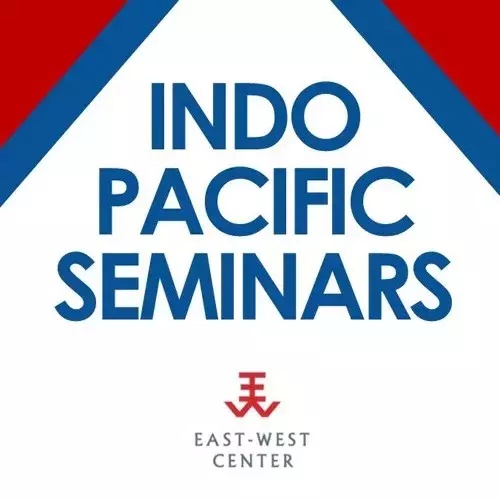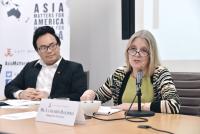
OFFICE/DEPARTMENT
A Vietnamese Perspective on the US-Japan Alliance & ASEAN-centric Security Institutions
An Indo-Pacific Foreign Policy and Defense Seminar featuring:
Mr. Quang Huy Pham
Visiting Fellow, U.S.-Japan-Southeast Asia Partnership in a Dynamic Asia Fellowship
East-West Center in Washington
Ms. Catharin Dalpino (Discussant)
Professor Emeritus, Edmund A. Walsh School of Foreign Service, Georgetown University
Dr. Ellen L. Frost (Moderator)
Senior Advisor, East-West Center in Washington
The US-Japan security alliance is one of the strongest relationships in the Indo-Pacific region. The US and Japan also have coordinated on regional institution building. However, the rise of China, divergences inside ASEAN-led institutions, concerns

within the alliance itself, Japan’s New National Defense Program Guidelines (NDPG) and the Trump administration’s uncertain foreign policy toward multilateralism, the shared role of the alliance on ASEAN-centric security institutions cannot be taken for granted. This seminar explored the impact of these concerns on regional security by highlighting how the alliance has dealt with the centrality of ASEAN, by examining the cases of ASEAN Regional Forum (ARF) and ASEAN Defence Minister’s Meeting (ADMM-Plus).
This seminar was part of a series tied to the U.S.-Japan-Southeast Asia Partnership in a Dynamic Asia Fellowship program jointly held by the East West Center and Osaka University’s Osaka School of International Public Policy (OSIPP). Generously funded by The Japan Foundation and US Embassy Tokyo, this fellowship has brought together two American, two Japanese, and two Southeast Asian fellows for three months to explore the following theme: How should the United States, Japan, and Southeast Asia collaborate on trade, investment, and economic integration in Southeast Asia?
For more images, please visit the album for this event on the East-West Center's Flickr page.
Quang Huy Pham is a visiting lecturer at the Diplomatic Academy of Vietnam (Hanoi). In 2018, he completed his MA degree in Peace Studies at the International Christian University (Tokyo). While affiliated with the U.S. – Japan – Southeast Asia Partnership in a Dynamic Asia fellowship from January to March 2019, Huy carried out research on the following topic: “Implications of the U.S.—Japan Alliance Upon the Performance of ASEAN-centric Institutions: A Vietnamese perspective.”
Catharin Dalpino is professor emeritus at Georgetown University and adjunct professor of professional practice at Seton Hall University’s School of Diplomacy and International Relation’s Washington Program. For the past eight years she has co-chaired the monthly Southeast Asia Roundtable, sponsored by The Asia Foundation. Dalpino also served as a deputy assistant secretary for democracy at the Bureau of Democracy, Human Rights and Labor, US Department of State. She has published several books on US policy in Asia, as well as numerous articles and op-eds, and has testified frequently before Congress on US relations with Southeast Asia and is a frequent commentator for major news outlets on Southeast Asia.
Dr. Ellen L. Frostis a Senior Advisor and Fellow at the East-West Center and a Visiting Distinguished Research Fellow at the National Defense University's Institute of National Strategic Studies. She writes and lectures frequently on Asia-related topics, especially Indo-Pacific political-economic issues and their strategic and security implications. Her most recent book is Asia's New Regionalism. She is also the author of For Richer, For Poorer: The New U.S.-Japan Relationship and Transatlantic Trade: A Strategic Agenda . Dr. Frost previously served in the US government as Counselor to the US Trade Representative, Deputy Assistant Secretary of Defense for International Economic and Technology Affairs, various positions in the Treasury Department and the State Department, and as a legislative assistant in the US Senate. During the 1980s she worked for two multinational corporations. She received a B.A. from Radcliffe College, an M.A. from the Fletcher School of Law and Diplomacy, and a Ph.D. in Government from Harvard University.
A Vietnamese Perspective on the US-Japan Alliance & ASEAN-centric Security Institutions
An Indo-Pacific Foreign Policy and Defense Seminar featuring:
Mr. Quang Huy Pham
Visiting Fellow, U.S.-Japan-Southeast Asia Partnership in a Dynamic Asia Fellowship
East-West Center in Washington
Ms. Catharin Dalpino (Discussant)
Professor Emeritus, Edmund A. Walsh School of Foreign Service, Georgetown University
Dr. Ellen L. Frost (Moderator)
Senior Advisor, East-West Center in Washington
The US-Japan security alliance is one of the strongest relationships in the Indo-Pacific region. The US and Japan also have coordinated on regional institution building. However, the rise of China, divergences inside ASEAN-led institutions, concerns

within the alliance itself, Japan’s New National Defense Program Guidelines (NDPG) and the Trump administration’s uncertain foreign policy toward multilateralism, the shared role of the alliance on ASEAN-centric security institutions cannot be taken for granted. This seminar explored the impact of these concerns on regional security by highlighting how the alliance has dealt with the centrality of ASEAN, by examining the cases of ASEAN Regional Forum (ARF) and ASEAN Defence Minister’s Meeting (ADMM-Plus).
This seminar was part of a series tied to the U.S.-Japan-Southeast Asia Partnership in a Dynamic Asia Fellowship program jointly held by the East West Center and Osaka University’s Osaka School of International Public Policy (OSIPP). Generously funded by The Japan Foundation and US Embassy Tokyo, this fellowship has brought together two American, two Japanese, and two Southeast Asian fellows for three months to explore the following theme: How should the United States, Japan, and Southeast Asia collaborate on trade, investment, and economic integration in Southeast Asia?
For more images, please visit the album for this event on the East-West Center's Flickr page.
Quang Huy Pham is a visiting lecturer at the Diplomatic Academy of Vietnam (Hanoi). In 2018, he completed his MA degree in Peace Studies at the International Christian University (Tokyo). While affiliated with the U.S. – Japan – Southeast Asia Partnership in a Dynamic Asia fellowship from January to March 2019, Huy carried out research on the following topic: “Implications of the U.S.—Japan Alliance Upon the Performance of ASEAN-centric Institutions: A Vietnamese perspective.”
Catharin Dalpino is professor emeritus at Georgetown University and adjunct professor of professional practice at Seton Hall University’s School of Diplomacy and International Relation’s Washington Program. For the past eight years she has co-chaired the monthly Southeast Asia Roundtable, sponsored by The Asia Foundation. Dalpino also served as a deputy assistant secretary for democracy at the Bureau of Democracy, Human Rights and Labor, US Department of State. She has published several books on US policy in Asia, as well as numerous articles and op-eds, and has testified frequently before Congress on US relations with Southeast Asia and is a frequent commentator for major news outlets on Southeast Asia.
Dr. Ellen L. Frostis a Senior Advisor and Fellow at the East-West Center and a Visiting Distinguished Research Fellow at the National Defense University's Institute of National Strategic Studies. She writes and lectures frequently on Asia-related topics, especially Indo-Pacific political-economic issues and their strategic and security implications. Her most recent book is Asia's New Regionalism. She is also the author of For Richer, For Poorer: The New U.S.-Japan Relationship and Transatlantic Trade: A Strategic Agenda . Dr. Frost previously served in the US government as Counselor to the US Trade Representative, Deputy Assistant Secretary of Defense for International Economic and Technology Affairs, various positions in the Treasury Department and the State Department, and as a legislative assistant in the US Senate. During the 1980s she worked for two multinational corporations. She received a B.A. from Radcliffe College, an M.A. from the Fletcher School of Law and Diplomacy, and a Ph.D. in Government from Harvard University.









